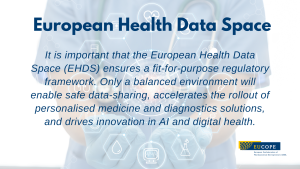News / Press Releases - May 5, 2022
EUCOPE’s reaction to the Regulation for a European Health Data Space (EHDS)
Yesterday, 3 May 2022, the European Commission published the proposal for a regulation introducing the European Health Data Space (EHDS). First introduced on the 16th of September by the European Commission President Ursula von der Leyen, the Commission aims for the EHDS to form a key element of the European Health Union that should reinforce the EU’s preparedness and response during crises in the health sector and should facilitate better use of data in the European Single Market.
The proposal aims is to enable better exchange and access to different types of health data (genomics data, data from patient registries, electronic health records, etc.), and foster primary use of data in healthcare delivery which should enable people individuals to better digital access to their personal health data and support free movement. In addition, secondary use of data, which are rules for the use of individuals’ non-identifiable health data such as access for research, innovation and public health policymaking, is set up.
EUCOPE’s position
EUCOPE welcomes the launch of the EHDS and its objective to enable better exchange and access to different types of health data. It is important that the EHDS ensures a fit-for-purpose regulatory framework. Only a balanced environment will enable safe data-sharing, accelerates the rollout of personalised medicine and diagnostics solutions, and drives innovation in AI and digital health.
What does it take to deliver on the ambitious promise of the EHDS?
1. Take the Member States’ diverse interpretations of GDPR rules into account
Due to the fragmented landscape, the data, when available, can be of disparate quality and complexity. An additional hurdle is the currently fragmented individual Member State interpretation of GDPR rules related to health data. The EHDS does dedicate significant effort to address cross-border exchange of information and it will be key to maintain the focus on these challenges in its implementation.
2. Enable secondary use of data for research purposes
In its response to the public consultation on the EHDS, EUCOPE recommend the adoption of EU-level data collection standards and promotion of data interoperability and exchange protocol, based on the experience of ERNs. We are happy to see some of these instances included in the final proposal and we further highlight the importance of enabling transparent and compliant secondary use of data for research purposes. As the proposal foresees the adoption of implementing and delegated acts further defining the technical specifications for the priority categories of personal electronic health data, we look forward to contribute to a seamless and streamlined system that allows to deliver on the promises of the EHDS.
3. Adequate resources and infrastructures for the EHDS governance
One of the challenges with the implementation of the EHDS will be for Member States to put in place adequate resources and infrastructures at national level so that its governance framework becomes reality. EUCOPE reckon the need for an appropriate legal and governance framework and adequate resources to cover the access to and exchange of health data for healthcare provision, research, policy-making and regulatory activities.
4. A multi-level governance approach including all relevant stakeholders
A multi-level governance approach is vital to make the EHDS a success. We welcome the proposal’s provisions regarding the cooperation of the EHDS board with stakeholders’ representatives, especially with representatives of patients, data holders and data users. We call for a continuous dialogue and inclusion of industry in this process.
Next steps
Following the Ordinary Legislative Procedure (OLP), the EHDS proposal will now be sent to and discussed by the European Parliament and the Council, EUCOPE will follow closely the legislative debate and engage with relevant stakeholders in the process. Regarding the Parliament, it is expected that ENVI, ITRE or IMCO will obtain the file, while the Council Configuration is most likely to be taken up by either EPSCO or TTE.

